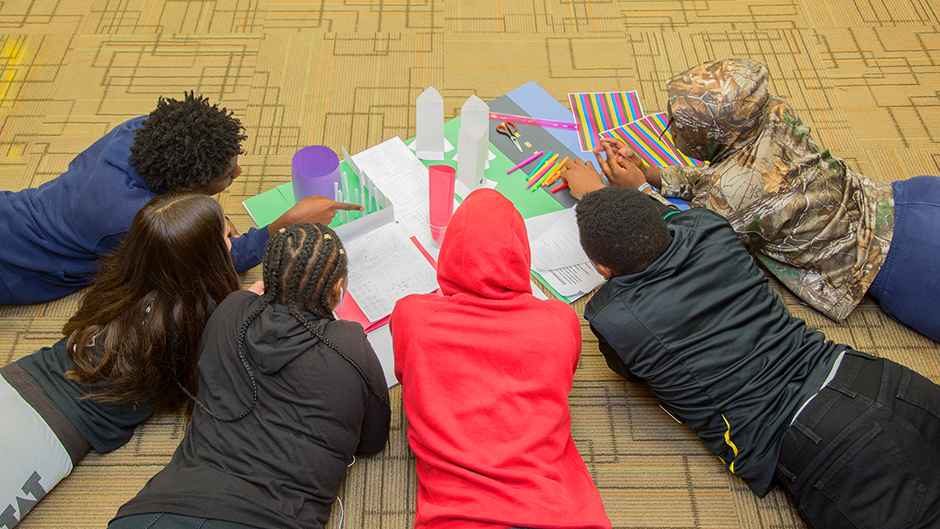A team of student and faculty mentors have been teaching entrepreneurial skills, tutoring academics, and providing life coaching this summer to foster-care teens as part of the First Star University of Miami Academy, a national program that lays the foundation for at-risk youth to succeed at college and in life. While the mentees grow in leaps and bounds from the support, the mentors recognize the personal growth and satisfaction that comes from helping others, especially young people who have been tossed and tumbled through a broken care network.
“These boys and girls come from disadvantaged backgrounds that are constantly shifting and where they get little guidance—they really just want help and mentorship,” said Henson Destiné, a University of Miami alumnus and second-year medical student at the Miller School of Medicine. “As a mentor, I developed a real connection with them and believe it’s important they don’t see themselves as a product of the environment they come from.”
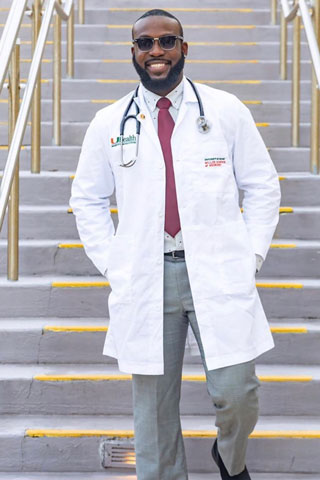
Destiné mentored with the academy group last year and was eager to help again, working some 40 hours a week virtually for the four-week session this summer.
“My involvement in First Star reminded me of where I started—the community that I came from—and why I wanted to go to med school in the first place, which is to have a voice and to help people,” he said. “If it wasn’t for the mentoring I got along the way, I wouldn’t be here. No one gets where they are without some help.”
The University launched First Star Academy in 2017, welcoming a cohort of students—9th-graders at the time—for the first of four residential summers. Living on campus serves as a cornerstone of the program because it removes the youth from their environments and provides a holistic academic experience. During the school year, the young people continue to attend their respective high schools and meet regularly on Saturdays with University staff, who provide educational advocacy and sustain engagement.
The academy has been fueled by the passion of Kele Stewart, law professor, along with the planning and research team of Laura Kohn-Wood, dean, and Wendy Morrison-Cavendish, professor, both in the School of Education and Human Development. Program director Maria Pia De Castro supervises the day-to-day operations as teacher, administrator, and social worker.
According to Stewart, 45 students—16 seniors from the original cohort in 2017 and 29 9th and 10th-graders that form a second cohort from 2020—participated this summer. Most participants are on track for graduation and meeting the indicators set by the program. It is estimated that there are some 400,000 youth in the foster care system nationally, with 3,000 in Miami-Dade County.
Kayla Mason, a senior pursuing a double major in microbiology and immunology, and public health, returned for her third summer session this year.
“We’re trying to help alter the kids’ lives. But speaking with my co-workers, we all feel that participating has had just as much change in our own lives,” Mason said. “I love the kids, love the program, and love the crazy busyness.”
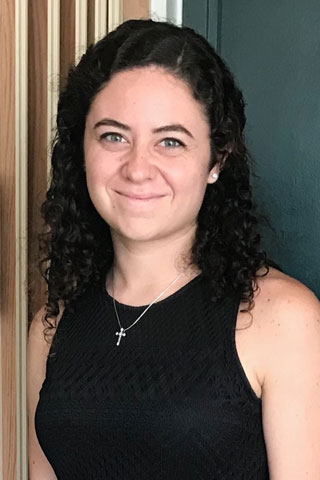
The COVID-19 situation prevented the youth from living on campus this summer, but the virtual interaction was still profound and meaningful, she said.
“I’ve always had an affinity for kids in the foster system—I knew how broken and messed up it was,” said Mason, whose family at one point slipped into homelessness and had to find support from relatives.
“First Star has made me 100-percent reconsider my life purpose,” she said. “Through interacting with the kids, I found out that I have an ability to connect, especially with this age group.” Mason said she “definitely” plans on becoming a foster parent when she’s older.
“My goals now are to go to grad school and earn some type of Ph.D. in science. But I’ve learned watching Kele [Stewart], who teaches classes, runs a clinic, and is so involved in this camp, that it’s not just about coming to your lab and then going home,” Mason noted. “It’s opened my eyes to possibly doing something like this when I finish with schooling—maybe start a First Star Academy in some other place.”
Mason was part of the entrepreneurial start-up module that was added this year to the regular math and language arts tutoring.
Rick Toren, entrepreneur-in-residence in management with the Miami Herbert Business School, volunteered to teach the eight sessions. He created the curriculum, drawing on his impressive career as an entrepreneur—he has patented a range of products for the health care industry—and his experience teaching inner-city youth as founder of the National Foundation for Teaching Entrepreneurship’s chapter in Washington, D.C.
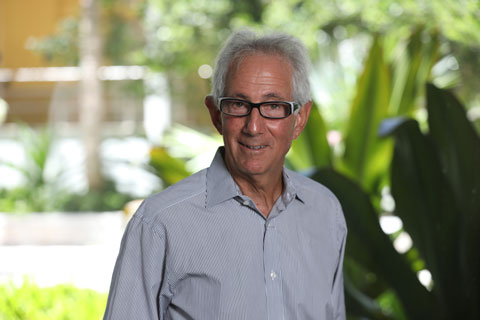
He used Zoom to teach basic business terminology and how to create a start-up, but Toren said the technology was challenging for the teens. Often the students were using borrowed computers that displayed different names and were obliged to participate from noisy and chaotic spaces that competed for their attention.
Still they persevered.
“I was really surprised in the last session at the answers and opinions they shared about franchising and businesses,” Toren said. “It was clear that they were listening and paying attention much more than it appeared—it was really gratifying.”
Federal and some state funds are available for foster youth to attend college, but lacking the skills, the study habits, and the support, they inevitably drop out. First Star seeks to lay a foundation for ongoing success.
Claire Zovko, a graduate of the law school and an assistant professor in the School of Education and Human Development, and Wifredo “Wifi” Fernandez, who recently earned his J.D. from the School of Law, shared their business experiences with the teens in the entrepreneurial module.
Zovko, with 10 years in the sports industry, discussed the challenges she faced launching her own yoga studio while emphasizing the importance of following your passions.
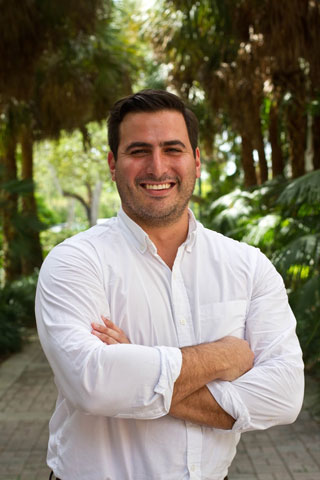
“What the world needs is for people to come alive and do what they love,” she told the teens, adding that “whatever you love to do is possible.’’ According to Zovko the teens “were very active and asked great questions—we had a beautiful, developing conversation.”
Fernandez, co-founder of LAB Miami in Wynwood and who has launched start-up incubators at two local colleges, talked to the teens about the travails of securing funding for start-ups.
“They asked very insightful questions, talked about the challenges of raising money and managing investors and expectations,” he said.
“They’re resilient and they’re wicked sharp, and that’s what prepares them to be effective entrepreneurs,” said Fernandez, who has extensive experience with the foster-care population. While at law school, he advocated for kids in the system through the Children and Youth Law Clinic, and he also served for years on the board of Our Kids of Miami-Dade and Monroe, the premier foster-care agency for South Florida.
“I have so many thoughts when it comes to the resources that these kids in foster care need,” he said. “First Star is such a really cool program—I hope to do more and hope that we can find ways to grow it.”
For more information, contact Maria Pia De Castro at m.decastro3@miami.edu.
